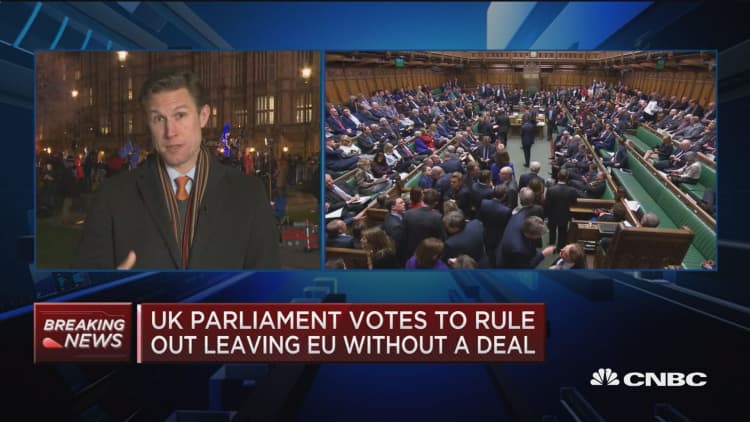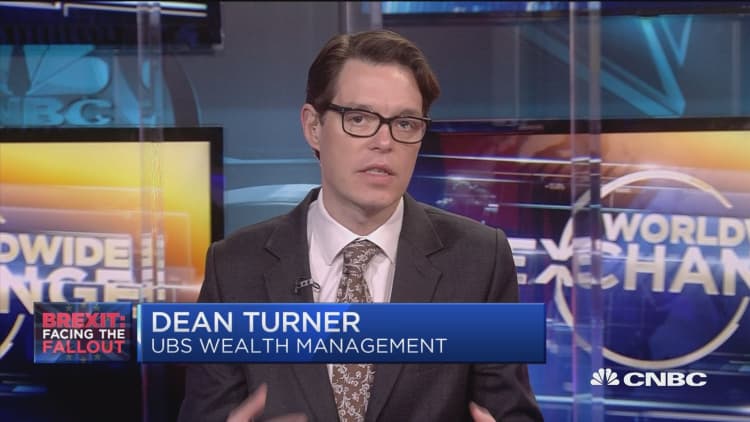
U.K. lawmakers have rejected the idea of leaving the European Union without a Brexit deal in place, setting up another vote Thursday on whether its official departure date should be extended.
A no-deal exit was widely expected to be defeated as most MPs (Members of Parliament) want to avoid the economic uncertainty and trade disruptions that it could cause.
However, the evening saw more drama than many had predicted after lawmakers effectively hijacked Prime Minister Theresa May's parliamentary motion. May's government had asked Parliament to vote on ruling out a no-deal Brexit for the official March 29 deadline. But before that, MPs narrowly backed an amendment that rejected a no-deal Brexit under any circumstance.
This important change led to May's government ordering its own MPs to vote against its own motion. But the amended motion still passed by 321 votes to 278. The vote was non-binding but it showed the strength of feeling among lawmakers and will hold political weight in future debates.
The pound was up about 2 percent against the dollar as investors become more optimistic that a hard Brexit would be ruled out.
"Today's large rebellion severely undermines Prime Minister Theresa May's authority and could lead to ministerial resignations," analysts at Citi said in a research note after the result. "Snap elections have become much more likely."

'No deal' still remains default
Infamously known as a "cliff-edge" Brexit, a no-deal exit would mean the U.K. abruptly ceases to be a member of the EU overnight on March 29. It would mean there would be no 21-month transition period in place to gently prepare for life outside the bloc it has belonged to for 46 years. It would also have to rely on WTO trading rules.
The vote was seen as part of some concessions given to Parliament by May a few weeks ago and was only confirmed Tuesday when MPs resoundingly rejected her Brexit withdrawal agreement for a second time. Some lawmakers believe it's unwise to take a no-deal scenario out of the equation as it could give the EU the upper hand in negotiations. Some also see it as the purest form of Brexit and rejected Wednesday's parliamentary motion.
While lawmakers have now indicated they don't want a no-deal Brexit, it's not guaranteed. With 16 days left until the official Brexit date, an agreement or an extension hasn't been ratified and May confirmed Wednesday that a "no deal" still remains the default.
Another vote Thursday
MPs will now vote again Thursday evening on whether to seek an extension to Article 50 (which oversees the departure process) thus extending the departure date beyond March 29. The EU would have to agree to this and the U.K. would have to give a good reason for requesting the delay.
Officials in Brussels are showing increasing signs of exasperation with the U.K. over its chaotic and confusing position on Brexit, warning that it will not renegotiate the deal on offer. Its chief Brexit negotiator Michel Barnier said ahead of Wednesday's vote that only the U.K. can break the impasse.

The U.K. government has struggled throughout the two-year departure process to find a consensus among MPs — among them ardent Brexiteers and staunch Remainers, often within the same party — over what kind of Brexit the country should seek, and how close the U.K.'s future relationship should be with the EU.
Paul Dales, the chief U.K. economist at Capital Economics, said investors had learnt over the past two years to not rule anything out.
"It's possible that an amendment to tomorrow (Thursday) night's vote will provide a clearer path to Brexit by allowing Parliament to vote on different Brexit options," he said in a research note.
"Equally, the current political instability means at some point the prime minister could resign and/or Labour tries to force a general election."


